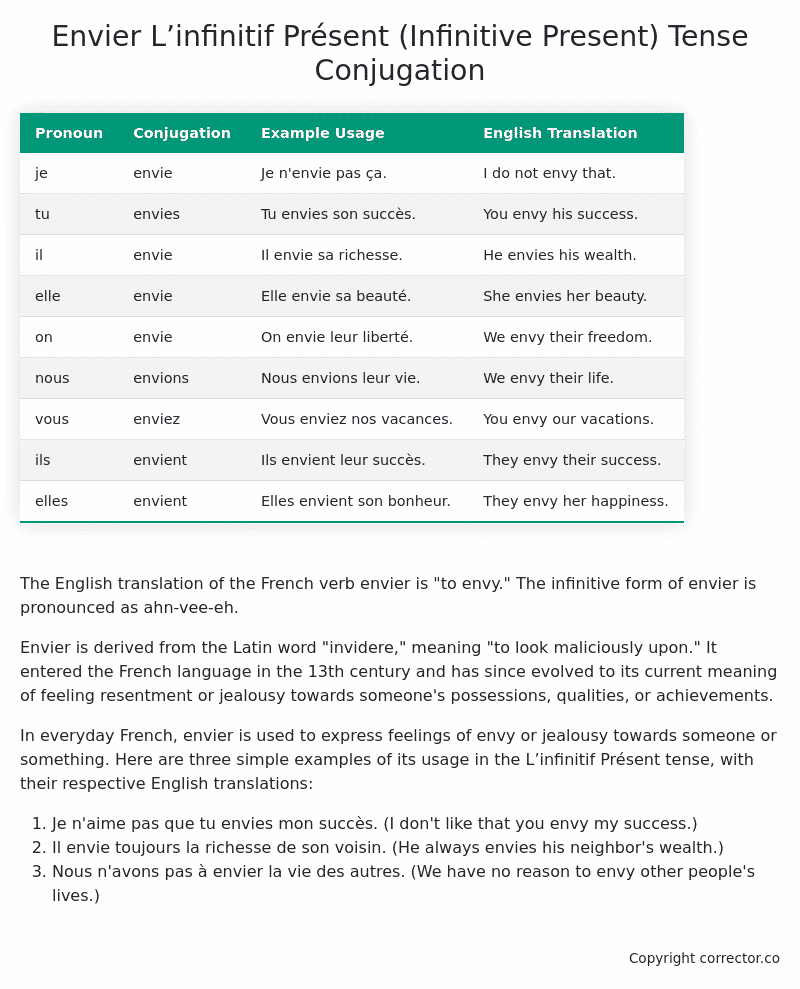L’infinitif Présent (Infinitive Present) Tense Conjugation of the French Verb envier
Introduction to the verb envier
The English translation of the French verb envier is “to envy.” The infinitive form of envier is pronounced as ahn-vee-eh.
Envier is derived from the Latin word “invidere,” meaning “to look maliciously upon.” It entered the French language in the 13th century and has since evolved to its current meaning of feeling resentment or jealousy towards someone’s possessions, qualities, or achievements.
In everyday French, envier is used to express feelings of envy or jealousy towards someone or something. Here are three simple examples of its usage in the L’infinitif Présent tense, with their respective English translations:
- Je n’aime pas que tu envies mon succès. (I don’t like that you envy my success.)
- Il envie toujours la richesse de son voisin. (He always envies his neighbor’s wealth.)
- Nous n’avons pas à envier la vie des autres. (We have no reason to envy other people’s lives.)
Table of the L’infinitif Présent (Infinitive Present) Tense Conjugation of envier
| Pronoun | Conjugation | Example Usage | English Translation |
|---|---|---|---|
| je | envie | Je n’envie pas ça. | I do not envy that. |
| tu | envies | Tu envies son succès. | You envy his success. |
| il | envie | Il envie sa richesse. | He envies his wealth. |
| elle | envie | Elle envie sa beauté. | She envies her beauty. |
| on | envie | On envie leur liberté. | We envy their freedom. |
| nous | envions | Nous envions leur vie. | We envy their life. |
| vous | enviez | Vous enviez nos vacances. | You envy our vacations. |
| ils | envient | Ils envient leur succès. | They envy their success. |
| elles | envient | Elles envient son bonheur. | They envy her happiness. |
Other Conjugations for Envier.
Le Present (Present Tense) Conjugation of the French Verb envier
Imparfait (Imperfect) Tense Conjugation of the French Verb envier
Passé Simple (Simple Past) Tense Conjugation of the French Verb envier
Passé Composé (Present Perfect) Tense Conjugation of the French Verb envier
Futur Simple (Simple Future) Tense Conjugation of the French Verb envier
Futur Proche (Near Future) Tense Conjugation of the French Verb envier
Plus-que-parfait (Pluperfect) Tense Conjugation of the French Verb envier
Passé Antérieur (Past Anterior) Tense Conjugation of the French Verb envier
Futur Antérieur (Future Anterior) Tense Conjugation of the French Verb envier
Subjonctif Présent (Subjunctive Present) Tense Conjugation of the French Verb envier
Subjonctif Passé (Subjunctive Past) Tense Conjugation of the French Verb envier
Subjonctif Imparfait (Subjunctive Imperfect) Tense Conjugation of the French Verb envier
Subjonctif Plus-que-parfait (Subjunctive Pluperfect) Tense Conjugation of the French Verb envier
Conditionnel Présent (Conditional Present) Tense Conjugation of the French Verb envier
Conditionnel Passé (Conditional Past) Tense Conjugation of the French Verb envier
L’impératif Présent (Imperative Present) Tense Conjugation of the French Verb envier
L’infinitif Présent (Infinitive Present) Tense Conjugation of the French Verb envier (this article)
Struggling with French verbs or the language in general? Why not use our free French Grammar Checker – no registration required!
Get a FREE Download Study Sheet of this Conjugation 🔥
Simply right click the image below, click “save image” and get your free reference for the envier L’infinitif Présent tense conjugation!

Envier – About the French L’infinitif Présent (Infinitive Present) Tense
Forming the Infinitive Present
Common Everyday Usage Patterns
As a Verb’s Dictionary Form
After Modal Verbs
As an Imperative
In Infinitive Clauses
Interactions with Other Tenses
Present Tense
Future Tense
Conditional Tense
Passé Composé
Imperfect Tense
Subjunctive and Conditional Moods
Summary
Want More?
I hope you enjoyed this article on the verb envier. Still in a learning mood? Check out another TOTALLY random French verb conjugation!


